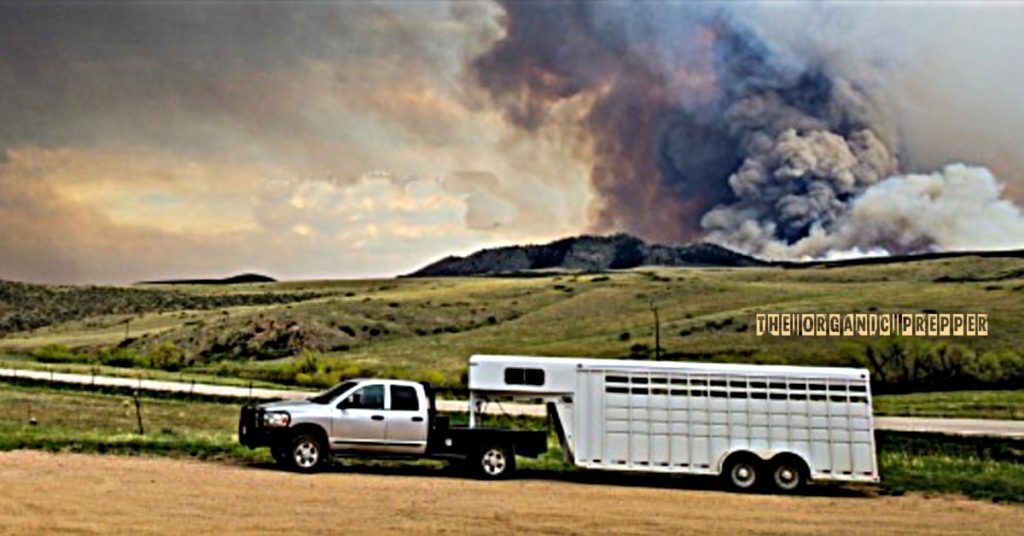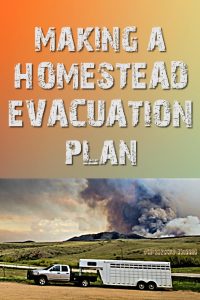by Daisy Luther, The Organic Prepper:

With wildfire season approaching in California, my thoughts are with my many friends there who have small farms. Even if you don’t live in a wildfire zone, if you raise livestock, you need to have a homestead evacuation plan. Any place can have a barn fire, a chemical spill, a flood, or other environmental emergencies.
TRUTH LIVES on at https://sgtreport.tv/
I’ve written quite a lot about evacuations since my family and I were right on the verge of it during the King Fire. Fires can approach shockingly fast, and being ready before there is ever a hint of smoke in the air is the best way to get out quickly when the time is short.
But things change dramatically when you add a farm or homestead to the mix. Suddenly, you have more living creatures in your charge than you do space in the vehicle. You absolutely must have a plan in place before a disaster occurs because if you wait for the evacuation order, you’ve waited too long.
Create a homestead evacuation plan.
Here are some of the things that I learned about homestead evacuation. Use this to create your own plan because disasters can strike anywhere and we all have different resources, livestock, and circumstances.
Be aware of what’s happening nearby. When I lived in California, I haunted the local boards that discussed fires and other events. I had friends who were former firefighters and subscribed to phone notifications from the local sheriff’s department. If there was a fire or mudslide nearby, I knew about it while it was still miles from me. That way, I could assess my plan and see if action needed to be taken immediately or if I just needed to stay on top of the situation.
 Figure out where you’ll take your livestock. Often, local fairgrounds will open their facilities for farmers to bring evacuated livestock. Sometimes veterinarians and kennels will also accept evacuated animals. If you are in contact with other farmers, they may be able to make room for your animals. I belonged to a local homesteading group at the time, and we all made space for animals, trailers, and RVs if we could to help our friends during fire season.
Figure out where you’ll take your livestock. Often, local fairgrounds will open their facilities for farmers to bring evacuated livestock. Sometimes veterinarians and kennels will also accept evacuated animals. If you are in contact with other farmers, they may be able to make room for your animals. I belonged to a local homesteading group at the time, and we all made space for animals, trailers, and RVs if we could to help our friends during fire season.
Evacuate livestock early if you can. The last fire that was nearby when I lived in California was called the Trailhead Fire, and it consumed 5,646 acres over the course of 20 days. Toward the end, when it drew closer to our farm, I evacuated all our chickens to a friend’s farm that was out of the danger zone. That gave me the peace of mind to know that if we had to evacuate for real, I only had to grab cats, dogs, and kid, which would have been far faster than chasing a bunch of panicked hens and a rooster determined to protect them.
Have a way to transport your animals. You will either need a trailer, pens that can go into the back of a truck, or crates that can hold your livestock. You may need help from friends with trailers if you have a lot of animals. Have these things ready so that you aren’t trying to figure out how to move the animals when a fire is approaching.
Have a plan for last-minute homestead evacuation. This is every farmer’s nightmare because if the fire is approaching fast, you may not be able to load up all your animals in time.
- Have trailers and trucks close to the livestock area for quick evacuation.
- If you think you may need to evacuate, contain your livestock in the smallest area possible for ease of loading. For example, if your chickens normally free-range, keep them contained in a yard around their coop so you have a better chance of catching them. Close off the gates to the larger pastures and keep other livestock in the area closest to the trailers.
- Practice loading up. This way, the animals get used to being loaded and are less likely to panic and fight you. Secondly, you know which animals are going to be the most uncooperative, and you also have a feel for how long it takes to load them all.
- Have blinders on hand. This may be nothing more than a piece of cloth or a fabric bag, but if your animals are panicking, it can be easier to lead them out if they can’t see the threat. Most people think only of horses needing blinders, but it can be far easier to lead goats and cows this way too.
- Give every person a job. Even younger children may be able to help round up chickens or gather feed. Be sure that everyone knows what to do beforehand so that you can all work together quickly and efficiently.
- Remember that if there is a threat like a nearby fire, animals are much more likely to panic due to fear. This means it will probably take longer to load them up.
Know what to do if you can’t evacuate the livestock. If there is no time to load the livestock, at least turn them loose so they have a chance at escaping the flames. If your family is at risk of dying in the fire, you will have to evacuate and leave the animals behind. It’s a horrible choice, but it could be necessary.
Remember the Napa Valley fires of 2017? Some people had only moments to flee fast-moving infernos. I also flashback to a hurricane that hit North Carolina and seeing reports on the news of people who had left their dogs kenneled. The pups barely survived the flood and were treading water near the top of the cages when rescuers discovered them. I was sickened that they’d been left in that horrible situation. At the very least, give your animals a chance at survival if you have no way to evacuate them.
Additional advice
Here’s some additional advice from a reader, DragonMaker, whose comment was so useful I got permission to add it to the article!
This subject is one I work with every fire season. In addition to leading a preparedness group for a local homesteading group, I did have to evacuate our homestead two years ago. We also were in Hawaii when the Japan Fukushima disaster happened and witnessed the chaos of a tsunami evacuation.
We live in a high risk fire zone in Nevada and sit down with family and friends to make an evac plan every spring.
All the advice given in this article is sound. A couple pointers I’d like to add though.Make a cardboard stencil of your phone number and spray paint it on the sides of anything bigger than a chicken. There’s a cutesy tip that circulates to use sharpie on hooves, but have you ever tried to read a nite written in the hood if a panicked horse? Not practical at all. You want your info seen from a distance with binoculars. Another option is a grease stick to write with on their sides.
Take photos of your animals for identification purposes. It’s common to have volunteers to go out on horseback to round up loose livestock after a fire. With photos, you can easily identify yours. I’ve even seen emus rounded up afterwards.
Know how much food each animal eats and have a plan to take a week at least with you. Often once your out, roads are blocked and you can’t get back home until the crisis is past.Sign up for all the alert systems in your area. Reverse 911 and a cell tower system are available in my area. They run separately and differently and often one will work if the other is compromised.
Identify multiple routes out if your area and “draw a line in the sand.” If a fire reaches “x” leave before you are trapped by fire or by other evacuees. We have a single small highway out if our area, so our x is strategic.
Before fire season, make sure you can catch your animals, bucket train them at least to follow a bucket of grain or come to a certain call.
Do NOT leave water running when you evacuate if you are on a GID system. It depletes the system and fire fighters don’t have what they need to save homes.
Have a “go bag” packed at all times- basic premier advice. My fire season bag includes camping supplies so I can stay with my animals at a fairgrounds or other place.
If you have LGDs, make a special plan for them. Make sure they are leash/kennel/tether trained so they don’t panic when confined or tethered to a strange corral.
Create signs/flyers with your info on it and have tape or Zipties to attach them to pens if you have to evacuate livestock to a fairground and leave them.Be prepared to use a chainsaw on all vegetation next to your home. Know that manure burns and will allow a fire to creep underneath it to a barn.
Also know that firefighters will cut fences and open gates to let livestock out, but they will not try to save them or catch them. Their priority is to stop fire not save animals.
And finally, if a fire is miles away and a fire crew shows up at your property line with hand tools and starts to make a fire break- get out asap. They know things that the rest of us don’t. They would not make that kind of effort without imminent danger.
Oh, and make sure you have water stored to care for yourself and animals at your property for a week if fire is in the area. Our water was severely compromised when a fire came close because standard procedure is to cut power to the area and our community wells generator sputtered out.
Thanks to DragonMaker for the great information!
Have you ever been through a homestead evacuation?
Have you had the experience of evacuating a homestead? What did you learn from it? Do you have a plan should you need to do so? How do you plan to manage your animals during an evacuation?
Read More @ TheOrganicPrepper.ca



